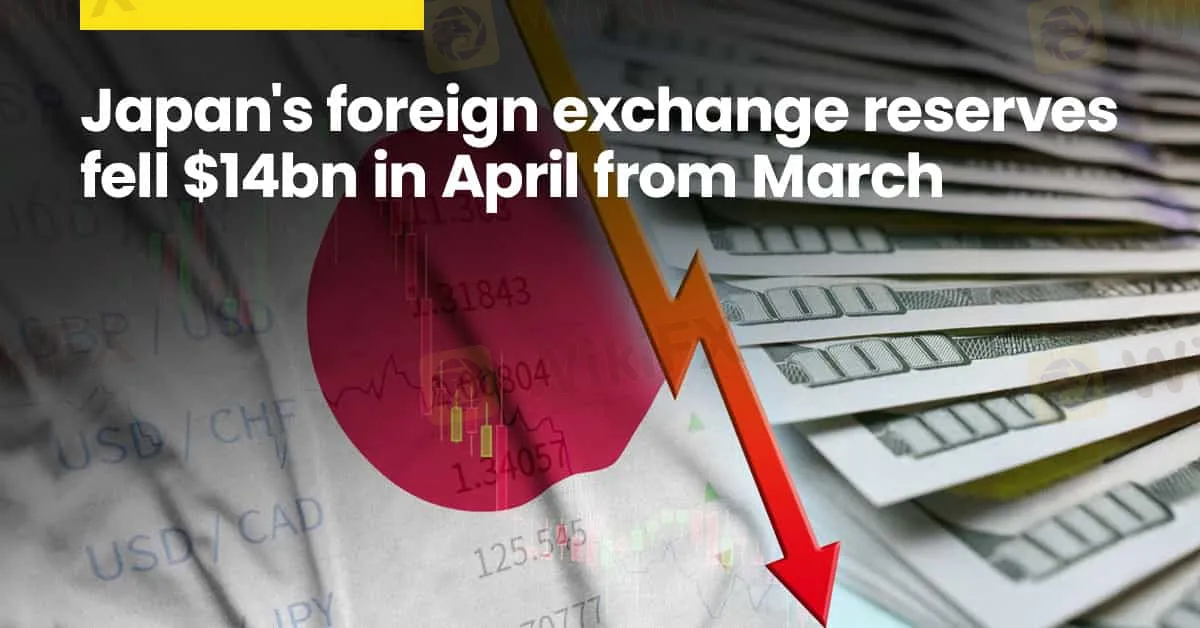简体中文
繁體中文
English
Pусский
日本語
ภาษาไทย
Tiếng Việt
Bahasa Indonesia
Español
हिन्दी
Filippiiniläinen
Français
Deutsch
Português
Türkçe
한국어
العربية
Japan's foreign exchange reserves fell $14bn in April from March
Abstract:In April, Japan experienced a significant decline in its foreign currency reserves, with a drop of $14 billion largely attributed to the decrease in the value of foreign securities holdings.

In April, Japan experienced a significant decline in its foreign currency reserves, with a drop of $14 billion largely attributed to the decrease in the value of foreign securities holdings.
According to a finance ministry report released on Thursday, Japan's forex reserves fell to $1.14 trillion in April. This decline was primarily driven by a decrease in holdings of foreign securities, which decreased from $995 billion to $978 billion compared to the previous month. The decrease in securities holdings was anticipated due to a drop in the market value of overseas assets, including Treasuries, as yields rose.
This data follows speculation that Japan intervened in the market twice to support the yen, with the first intervention occurring at the end of April. While Japanese officials have not confirmed any intervention, a Bloomberg analysis of the central bank's current account suggests that the nation likely entered the market twice last week. The estimated amount of yen bought during the first action is approximately ¥6.2 trillion ($40 billion), based on updated data and money broker estimates.
Japanese officials have consistently maintained a strategy of neither confirming nor denying intervention, leaving investors to infer market moves. Finance Minister Shunichi Suzuki and his deputy declined to confirm any interventions when questioned by reporters last week and earlier this week, respectively.

Disclaimer:
The views in this article only represent the author's personal views, and do not constitute investment advice on this platform. This platform does not guarantee the accuracy, completeness and timeliness of the information in the article, and will not be liable for any loss caused by the use of or reliance on the information in the article.
Read more

Gold Suffers Largest Drop in Six Months — What’s Next?
Gold suffers its sharpest weekly drop in six months as risk appetite returns—what comes next?

The Forces That Move Markets & How to Read Them
The financial markets are always moving, reacting to news, data, and changes in how people feel about the economy. Understanding what causes these changes is important for anyone involved in trading or investing

The Dollar Rally May Falter—Key Signals Investors Should Watch
The recent performance of the U.S. Dollar Index (DXY) in global forex markets has revealed a noticeable divergence.

Interactive Brokers Adds Ping An of China ETF to No-Fee Program
Interactive Brokers now includes Ping An of China CSI HK Dividend ETF in its no-transaction-fee program, offering investors low-cost access to Hong Kong’s top dividend-paying stocks.
WikiFX Broker
Latest News
RM4.8 Million Gigamax Scandal: Investors Still Waiting for Answers
All About BotBro: Unregulated Forex Scam Costs Investors Millions
NCC Bank Review: Expanding Services Amid Regulatory Concerns
Spain Cracks Down on €20 Million Crypto Laundering Network Linked to Organized Crime
Spain Ramps Up Crackdown on Investment Scams and Unregistered Platforms
Coinbase Targeted in $20M Extortion Plot After Customer Data Breach
FCA Secures Over £300,000 in Confiscation Orders Against Investment Fraudsters
International Operation Shuts Down €3M Fake Trading Platform
The Forces That Move Markets & How to Read Them
Trade Nation 2025 Review: Spreads, Platforms, FCA and ASIC Licenses
Currency Calculator


